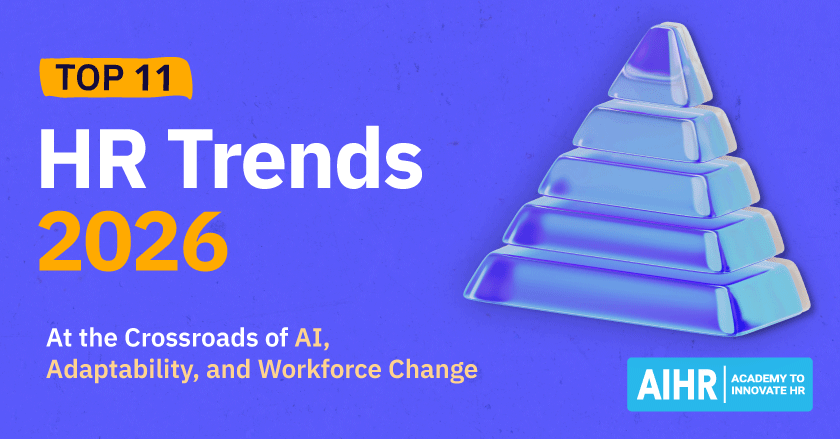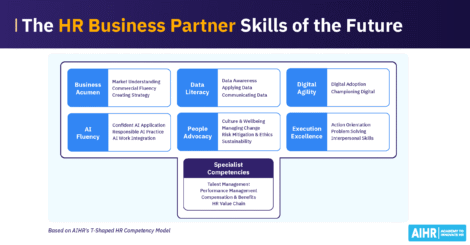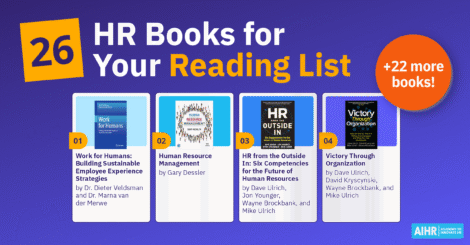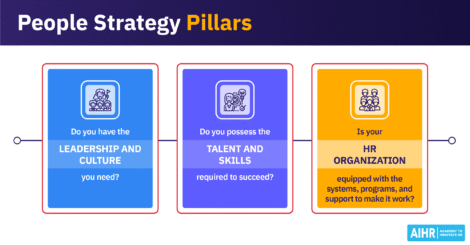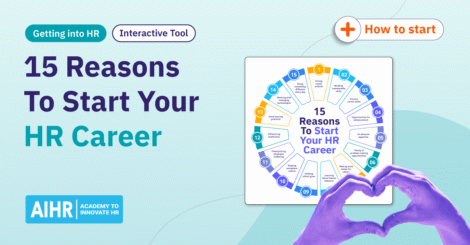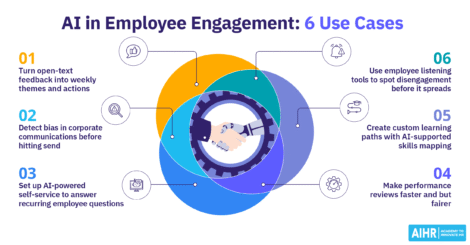As entrepreneur Steve Wynn famously said, “Human Resources isn’t a thing we do. It’s the thing that runs our business.” This reminds us that HR is at the heart of every organization’s success. So, take the HR Professional Day to recognize your hard work and prioritize your own professional development—it’s just as important as the value you bring to others.
To honor the day, we’ll explore what Human Resource Professional Day means and how you can meaningfully celebrate it.
Contents
What is HR Professional Day?
When is HR Professional Day?
A brief history of Human Resources
How to celebrate HR Professional Day
FAQ
What is HR Professional Day?
Human Resource Professional Day is about honoring the invaluable work of HR professionals. The day is celebrated every year on September 26th.
How did it start? Governor-General Sir Patrick Allen initiated the day in October 2013 to pay tribute to the HR profession. HR Professional Day, sometimes also referred to as HR Appreciation Day, is also celebrated across several countries, although it might not be as well-known as International HR Day (IHRD). IHRD is celebrated on May 20th.
Human Resource Professional Day is not just about honoring HR professionals but about taking time to reflect on and prioritize your professional development. It’s also a time to raise awareness about HR within the profession and business at large, particularly since HR is one of the fastest-growing professions.
When is HR Professional Day?
Every year, HR Professional Day is celebrated on September 26th, and HR Professional Day 2026 falls on Saturday.
Here’s a helpful overview of the next five years to ensure you don’t miss this special date.
2027
Sunday
2028
Tuesday
2029
Wednesday
2030
Thursday
2031
Friday
A brief history of Human Resources
Human Resources has evolved quite a bit over the years. When work changes, so do the expectations of organizations and HR’s role in enabling this transition. HR has also developed in line with changing business circumstances. For example, the Second Industrial Revolution led to manufacturing. This shift led to a need for HR to focus more on workplace health and compliance.
Let’s explore some key moments in HR history.
Early 1900s
The National Cash Register Company in the U.S. is believed to have created the first personnel department after a series of strikes and quality control issues. The department primarily dealt with recruitment, workplace safety, and employee complaints.
1910s-1920s
Frederick W. Taylor, an American engineer, initiated the scientific management movement to improve worker productivity. In 1911, he wrote the book The Principles of Scientific Management, which laid the foundation for efficiency-focused personnel management.
1930s-1950s
The Great Depression and WWII led to increased participation in labor unions. Laws such as the National Labor Relations Act protect workers’ rights to unionize in the U.S. From the 1940s onward, regulatory compliance and labor relations are critical to HR’s responsibilities.
1960s-1970s
A series of groundbreaking laws were passed in the 1960s: the Equal Pay Act, The Civil Rights Act in the U.S., and the Race Relations Act in the U.K. As a result, equal opportunities and fair treatment begin to shape HR practices. The term “human resources” became widely used in the 1960s. In the 1970s, other regulations like the Occupational Safety and Health Act (OSHA) added an increased focus on workplace safety to HR’s role.
1980s-1990s
The use of computers in the workplace supported the rise in HR technology such as HR information systems (HRIS), allowing employee and payroll records to be stored and accessed electronically. It led some companies to downsize or outsource their HR departments.
2000s
Although digital transformation continued with the use of data analytics in the late 2000s, “Human Resources” rebranded as “People” and “Talent” departments. There is a growing emphasis on improving HR’s relationship with employees, leading to more employee engagement initiatives.
Present
HR is a more strategic function that is critical to driving an organization’s business growth.
How to celebrate HR Professional Day
1. Take a moment to appreciate the value HR adds to organizations
Without question, HR plays a fundamental role in an organization’s success, mainly because of HR professionals’ deep understanding of people and how to drive organizational performance through people.
HR provides value across the employee life cycle – from hiring, training and development, and performance management to engagement and wellbeing. Not to mention HR’s other superpower, aligning an organization’s strategic objectives with key HR initiatives and processes.
“I believe HR has a massive role to play in creating sustainable, equitable, and profitable businesses. By enabling and supporting the business, we also impact people’s work experiences within broader society and economies.”

Although it’s challenging to cover the breadth and depth of HR’s responsibilities fully, here are some ways HR adds value:
- Talent acquisition and recruitment: HR ensures the organization attracts the right talent with the right skills and capabilities to fill various roles. By securing top talent, HR helps an organization fulfill its strategic objectives.
- Skill and competency development: Through designing and implementing training and development programs, HR equips employees with the skills, knowledge, and competencies needed to transform an organization’s goals into reality.
- Succession planning and leadership development: By proactively anticipating leadership requirements, HR develops succession plans that identify future leaders to step into critical roles. Planning ahead minimizes disruptions, making the transition smoother.
- Performance management: With well-designed performance evaluation practices linking individual and team goals to strategic objectives, HR guides employees to understand their contributions and identify areas for growth.
- Employee engagement: HR designs initiatives to inspire and motivate employees to put in their best efforts, which helps an organization achieve its business outcomes.
- Change management: During transformation and change, HR manages the transition. They keep employees informed, address concerns, and provide necessary training to ensure a seamless change management process.
- Organizational culture: HR shapes and reinforces desired cultural norms and behaviors by promoting the organization’s overall vision to employees and fostering a culture of inclusion, belonging, and trust.
- Data-driven decision-making: By leveraging workforce analytics, HR provides valuable insights that guide strategic decisions such as talent management, resource allocation, and performance enhancement.
- Risk management and compliance: HR ensures all human capital practices adhere to legal and regulatory standards. This minimizes potential reputational risks that can negatively impact strategic objectives.
- People analytics: By defining and tracking metrics related to talent acquisition, employee performance, engagement, and more, HR teams ensure these metrics align with strategic metrics. These efforts provide a clear picture of progress and areas for improvement.
2. Discover the skills that will elevate your HR game
HR Professional Day is the perfect day to reflect on your professional development. As the business landscape and society continue to change, HR must adapt to help the organization and employees navigate the disrupted way of work.
Consider, for instance, the adoption of new working models, the rapid uptake of generative AI, or the growing pressures on organizations to adopt sustainable practices. These shifts will require new skills to be learned to continue to excel in HR and deliver value for the organization.
To stay competitive and relevant in the world of HR, it’s important to develop a broad range of skills while deepening expertise in specific areas—this is what it means to become a “T-shaped” HR professional.
The T-Shaped HR Competency Model supports HR professionals in adapting to new expectations and challenges the volatile reality brings. The framework introduces five core competencies and skills needed to meet these challenges and become an impactful HR function.
Let’s unpack the core competencies you need to develop regardless of level, role, or organizational size:
- Business Acumen: The ability to transform the organization’s purpose, mission, goals, and context into strategy. This positions HR policies and activities that best serve the organization’s interests.
- Data Literacy: The ability to read, apply, create, and communicate data into valuable information to influence key decision-making processes.
- Digital Agility: The ability to utilize technology to increase the impact of HR and prepare the organization to adopt new digital tools and practices.
- People Advocacy: The ability to create a strong company culture, get the best out of people, and act as a trusted champion and communications expert.
- Execution Excellence: The ability to interpret external trends, analyze customer needs, and co-create business strategies to achieve sustainable business results.
Additionally, HR professionals must develop at least one competency within specialist competency areas, such as Talent Growth or People Operations. If they are responsible for the people management of HR teams, HR professionals will need to become proficient in leadership.
Put your T-shaped HR professional skills to the test
How T-shaped are you and your HR team? Find out by taking our T-shaped assessment!
There’s some truth behind the stereotype of an HR professional wearing many hats. You’re probably already part of several cross-functional projects that require a wide range of knowledge and skills. And if you’re not, you soon will be.
Becoming a T-shaped HR professional will enhance your HR skills, particularly broadening your ability to handle diverse strategic initiatives such as diversity and inclusion, digital transformation, organizational strategy, and leadership development.

3. Make an HR professional development plan
Once you’ve identified the key skills you need to improve, it’s time to create a personalized development plan. A strong HR professional development plan outlines specific goals, timelines, and resources to help you close the skill gaps and strengthen your expertise. Start by prioritizing which skills are most relevant to your role or organization’s needs—whether it’s mastering new HR technologies, boosting your business acumen, or enhancing your leadership competencies.
Set clear, actionable goals for each skill, such as enrolling in a certificate program, attending industry conferences, or finding a mentor with experience in that area. Don’t forget to include milestones to track your progress and hold yourself accountable. A well-structured plan not only keeps you focused but also ensures continuous growth in your HR career, positioning you as a key contributor to your organization’s success.
We’ve put together this handy customizable HR professional development template that you can use to create your own growth plan:

Top tips from AIHR experts
Dr Dieter Veldsman, Chief HR Scientist:
My first boss once told me, “You are paid to think, not only paid to do.” That advice has stuck with me throughout my career to guard against simply being busy and executing without understanding why this matters, where this fits, and be curious about why it works.
Remain curious about the field and take time to understand what the various HR functions do. It is about your contribution and how this is linked to others.
Dr Marna van der Merwe, HR Subject Matter Expert:
As HR professionals, we rarely focus on ourselves and our own development.
- My first tip is to make time for your development. Be clear on your contribution and how you believe you can add value to the organization.
- Spend time on understanding the business, as well as your own skill set. This will guide you on the skills you need to develop and what your next career step would be and help you define what career success looks like for you.
- Don’t be afraid to take unconventional avenues to develop skills and learn new things. Some of my greatest learnings have come from other avenues beyond my day-to-day work. If you remain curious, there is always something to learn.
4. Build a peer learning group
Consider establishing or joining an HR peer learning group. This could be a regular meetup where HR professionals from your organization—or even across different companies—gather to exchange ideas, discuss challenges, and share best practices. You can also attend HR webinars or workshops with fellow Human Resources professionals.
Peer learning groups provide a chance to expand your professional network, expose yourself to new perspectives, and keep each other accountable for professional growth. HR Professional Day is a great time to kick off this initiative or introduce it to your team as a long-term investment in both personal and collective development.
5. Share knowledge and celebrate successes with your HR team
HR Professional Day is also an opportunity to connect with your colleagues and celebrate the collective achievements of your HR team. Organize a team lunch, virtual meetup, or recognition event where everyone can share their recent wins or lessons learned. It could be as simple as acknowledging a project that went well or a tricky employee issue that was successfully resolved. Celebrating these successes boosts morale and highlights the critical role HR plays in shaping organizational culture.
Incorporate a learning element into the celebration by encouraging team members to share a key takeaway from a recent workshop, course, or project. This way, the celebration also becomes a mini knowledge-sharing session, allowing everyone to benefit from each other’s experiences and growth.
Human Resource Professional Day is about embracing professional growth
HR Professional Day 2026 will be different for everyone. But one thing is for sure. HR professionals deserve recognition. Over the last few years, you’ve faced the incredible challenges brought by the pandemic. And many of you have been central to your organization’s recovery efforts – designing and implementing new systems and ways of working.
As you celebrate your achievements on HR Professional Appreciation Day, reflect on how you will prioritize your ongoing HR professional development. Acquiring the necessary skills and competencies – such as those of a T-shaped HR professional – will be crucial to be ready for the challenges we will face in the future. Your growing strategic role will be essential in guiding your organization into the uncertain future of work.
FAQ
Human Resource Professional Day, also known as HR Appreciation Day, is about honoring the invaluable work of HR professionals. The day is an appreciation of the incredible role HR professionals play and raises awareness about the HR field as a whole.
The day is celebrated every year on September 26th. HR Professional Day 2026 is on Saturday.


